Why they do what they do — write
View(s):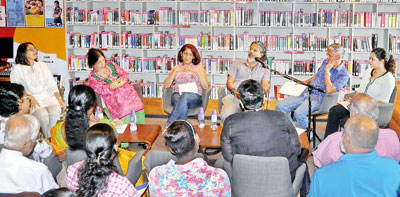
The shortlisted authors at a reading of their work at the Orion City British Council last week. Rizvina Morseth and Charulatha Abeysekara Thewarathanthri were not present. Pic by Nilan Maligaspe
The Sunday Times caught up with the authors shortlisted for this year’s Gratiaen Prize to discuss books, reading and writing ahead of the final announcement of the winner on May 27. The Prize was founded by Michael Ondaatje in 1992 and recognizes and rewards creative writing in English by a Sri Lankan citizen resident in Sri Lanka. Creative writing eligible for the prize includes novels, collections of short stories, poetry, drama as well as autobiography, biography and memoirs, both published and or in manuscript form.
Shehan Karunatilaka- Short Eats
At the shortlist, it was mentioned that Short Eats came about as a result of procrastination and attempts to finish your second book. Could you tell us a little bit about Short Eats? (13 stories is an impressive procrastination project. Most of us wander off to watch cat videos.)
I could write a novel about the things I do to avoid writing a novel. One of the many silly games I play is to think of ideas for stories that I’m going to write as soon as I finish the one I’m writing. It’s much easier to think up ideas for unwritten novels than to actually write one.
After years of trying to make the second novel work, I ended up with 13 short stories, 13 very short stories and no novel. I was writing mainly to amuse myself, so I did whatever interested me. There are stories about SL advertising, SL politics and SL sex. One story features a time machine, one spans 2000 years, and a couple are attempts at writing action movies. It now looks like Short Eats will end up being the second book.
What short fiction writers do you enjoy reading?
I didn’t quite have a grasp of the genre, so I read as much as I could. I began with classics by O Henry, Saki, Somerset Maugham and Roald Dahl and ended up with more contemporary work by Jhumpa Lahiri, Raymond Carver, Chuck Palahniuk and Amy Hempel. Plus lots of King and Gaiman. I do enjoy modern stories where nothing happens beautifully, but like Shyamalan, I prefer old school tales with reversals at the end.
What’s your editing process like and what did you edit out of this book?
Basically, you write a heap of stuff and then take out the confusing and boring bits. The first part is much harder than the second. With shorts I usually spend two weeks brainstorming, two weeks writing and six months revising. Editing is my favourite part of the whole game. I amputate plots, disfigure characters, surgically enhance voices and butcher irrelevant ramblings. As Nick Cave says, “there’s nothing that a pair of scissors can’t fix.”
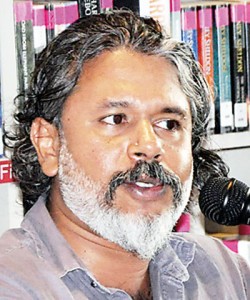 Have you ever had reader’s block?
Have you ever had reader’s block?
Sadly yes. And like its more notorious counterpart, it can be cured by allocating daily time and by switching off the wi-fi. It’s usually caused by reading bad or tedious books. I used to have a policy of finishing everything I started reading. Now if it doesn’t grip me by page 50, I chuck it. Life being too short, and all that.
How has the publication of your first book changed your writing process?
I work in a larger room with prettier lights, but still use the same basic tools: pencil, paper, fingers, eyes, ears, and most importantly, nose.
Do you google yourself? (If yes, what’s the strangest thing you’ve read about yourself?)
Sadly, yes again. When Chinaman first came out, I used to do it obsessively and read everything with my name tagged. But it’s a very bad habit and I haven’t done it for years. That’s a lie, I just did it now.
Nothing really strange comes to mind. Though I did read that apparently I dye my beard grey, an allegation which I’m neither confirming nor denying.
By Adilah Ismail
Vivimarie Vanderpoorten – Borrowed Dust
Could you tell us a little bit about Borrowed Dust ?
Borrowed Dust is a collection of about 55 poems, with a couple of them being very short prose pieces. They were written over six years. The title was from the title of my blog which was never really updated or anything but I used to post random poems there… and it was a collection of most of the articles and reviews about my previous work. The title was meant to capture the fact that whatever we write evolves from what we have read and studied and admired before, which shapes our thought processes, and much of the experiences of which I write are shared interactions. The title was also meant to capture my deepening awareness of growing old, the idea of mortality and that our body and everything we are made up of is borrowed from the earth and will end up as dust. I felt the poems ultimately reflect such a reality, and convey a sense of impermanence.
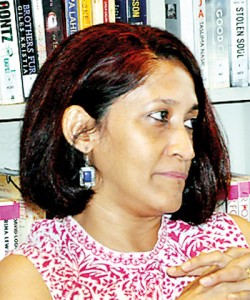 You have two previous collections of poetry and this is your first collection of poetry in six years. How did publishing two collections change your writing process?
You have two previous collections of poetry and this is your first collection of poetry in six years. How did publishing two collections change your writing process?
Actually for me it has been kind of scary to write and publish each time a book was already out. I was very reluctant to publish my second collection, “Stitch your eyelids shut” after the response (and the prize) I got for the first one. I was terrified that the second book will not live up to expectations. However opinion on that is divided, I have had people tell me that the second was better than the first, and vice versa.
After the second, I took all these years to get a collection together because of two reasons, one was that I became head of department at my university for three of those six years and the gruelling soul crushing work that was involved in being an administrator while doing my full academic load just left no time nor inspiration to write. But I used to scribble the occasional poem in some notebook and managed to find them to include in Borrowed Dust. The other reasons was that,like before, I was quite terrified that what I wrote may not be any good. Although I had never put in my second book for the Gratiaen, it jointly won the State Literary award, so there was some validation in that sense so there would be higher expectations for the third book. I spent more time editing what I wrote.
Also I was plagued with thoughts that I had no more poetry in me to write. I guess you could say I am an extreme case of low self esteem when it comes to writing, and that is not a cool thing to say or be at all, but it is true. I am my own harshest critic.
What did you edit out of the collection
I edited out a couple of poems… one was about my grandfather whom I adored… and the other was something about homeless people and the anti-homeless slopes and spikes that buildings have used around the world (called defensive architecture), I brought in the idea of Hans Christian Anderson’s short story “The Princess and the Pea” etc but somehow those poems didn’t turn into well-crafted pieces in my eyes, so I left them out.
What was the first book that made you cry?
I am sure some bedtime story or another, or something read to me by my mother or father or grandfather about an animal made me cry when I was really little, but the first book ( that I can remember) was Thomas Hardy’s Tess of the d’Urbevilles. Gosh I must have been about 13, and I wept.
What was an early experience where you learned that language had power?
It was perhaps when I was a very young child and my mother would tell me to ask for something ‘nicely’!! But what I remember is that throughout junior secondary school and upto Grade 10, I used to try very hard to write beautifully in Sinhala, and by 9th and 10 grades I was getting the Sinhala prize at the prize giving and the teacher would read out my essays in front of the class and praise me saying that I used beautiful language. I guess she didn’t know the complexity of my ethnic background and assumed I could not be expected to be good in Sinhala, but I earned her praise and respect with my language and I used to be super thrilled. (Sadly my Sinhala has deteriorated much since my undergraduate days because I never had to write regularly in Sinhala since then… but I am working on improving it.)
Rizvina Morseth de Alwis – The Memory of Loss
Tell us a little bit about yourself
I am a voracious reader. I love travelling, movies and music and good food. I am not a foodie but love watching Masterchef – the Australian version (hate the US version). I am married to Dinesh, a lawyer, who doesn’t read novels or any form of fiction but is my biggest fan! I come from a close knit family of four girls and one boy and when we get together it can be a riot. I received my Bachelor’s from the University of Peradeniya in English Literature and went on to do my Masters in Gender and Development at the London School of Economics. I work for the United Nations Population Fund (UNFPA) and am very passionate about our mandate on reproductive health and women’s rights. My work takes me to places one wouldn’t normally choose to go to and I love that about my work. Currently, I am based in DPR Korea.
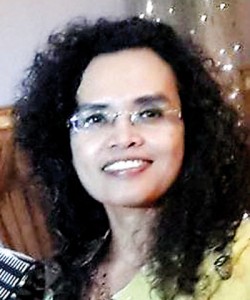 The Memory of Loss takes on love, loss and family ties and deals with themes similar to your first book It’s not in the Stars. Would be interested in hearing about what prompted the writing of this book and also what drew you to these themes?
The Memory of Loss takes on love, loss and family ties and deals with themes similar to your first book It’s not in the Stars. Would be interested in hearing about what prompted the writing of this book and also what drew you to these themes?
Yes, I am drawn to these themes of love, loss and family ties. They are universal themes aren’t they? But I think I am drawn to them because of my interest in the institution of family and marriage. I am interested in exploring the extent to which private and personal relationships are socially regulated – ie, whom to love, who to marry and whether to remain in a marriage or not. It is where the personal becomes the political. Many consider the ‘Family’ to be the bedrock of society, of civilization…
I am more interested in looking at how family can be both nurturing/loving and restrictive/oppressive at the same time, particularly to women and girls. In this novel, I explore the complicated nature of relationships within a family, between husband and wife, parents and children, brother and sister and consider how sometimes what is good for the family may not always be what is good for the individual.
So, I don’t think a particular person or incident prompted me to write this book. But I can say that I drew inspiration from the many women in my life, my mother, my sisters, my friends and women I have come across during the course of my work. In that sense, it’s quite personal.
What was the hardest thing about writing this book?
I think it is the process of editing and refining the book. It never ends. Even though I have submitted it for the Gratiaen Prize, I still keep tinkering with it. So, the hardest part for me is not only working on a sentence until it conveys what it should, but knowing when it has been achieved.
How did you begin writing? Did you always intend to be a writer?
I have been writing for a very long time, but not for public consumption, because writing for me has always been an act of self-reflection. So, I didn’t really have any serious aspirations of becoming a writer. But when I started putting together my collection of ‘random thoughts and vignettes’, my first novel began to take shape. Initially I was very secretive about it, but later on I shared it with a few close friends who gave me encouraging feedback. But I thought they were being polite. But then I shared it with my university professor and she was very candid with her feedback. Her brutal honesty was the most helpful feedback I received and I believe it actually influenced the final shape of the novel.
Years later, I submitted it to the Gratiaen prize almost on a whim. When it was shortlisted it boosted my confidence as a writer. Encouraged by my husband, I published it three years later. It went on to win the 2015 Fairway Literary Prize and the State Literary Award in 2016, which kind of reassured me and spurred me to continue with my writing.
Who are your literary influences?
I am drawn to writers from the region, particularly the subcontinent, and love reading books about the global South. The colonial experience, the ‘minority/outsider’ experience interests me. I like to read books about characters that transgress social norms. God of Small Things, Midnight’s Children, Funny Boy, A Suitable Boy are all-time favourites. Arundhati Roy, being both an activist and a writer, inspires me the most. But works of Austen, Eliot, the Brontes, Woolf are what I was more or less raised on and they have stayed with me through the years and I guess their influence lingers.
Charulatha Abeysekara Thewarathanthri-Stories
Tell us a little bit about yourself
I automatically identify myself as a mom and wife. We are a moving family, constantly in and out of Sri Lanka. For our children, the one stable thing in their ever-changing world is family. Our family is pretty close-knit. And being the ‘mom’ of that family is my primary role.
As for what sort of a person I am, guess easy-going and open-minded describes me best. I grew up as an only child with my mother, (and my father visiting or taking me out) very much a loner, dreamer and romantic. Books, movies, dramas, pretty much any form of story-telling, were portals into magical new worlds. The characters I loved and admired are as responsible for raising me as my parents.
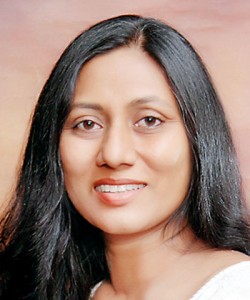 What is Stories about? What prompted you to write this and how long have you been working on it for?
What is Stories about? What prompted you to write this and how long have you been working on it for?
Stories is about a child whose reality is vastly different to most. The world she experiences is very similar to the imaginary world I created around myself while spending school holidays with my own lokuamma and mahappa at their estate in Ruwanwella.
I really don’t know why I began to write this book when I did. One day, I just had to write it. Many have asked me, “Where on earth did this story come from?” The setting came from my own childhood spent dreaming away under the rubber trees. As for the story, it just came walking into my head. That’s just the way it works for me… when a book insists on being written, I write.
It took me three and a half years to finish it, and then maybe close to another year to polish it.
What did writing this book teach you?
It made me realize that I have rather lost touch with the child in me… and renewed that bond. And reminded me again of something I knew as a child; just because you cannot prove something is there, it does not mean it isn’t.
Which authors inspired you to write?
Khalil Gibran, Salman Rushdie and my own parents.
Do you have any bad habits as a writer?
I guess not. Because all the habits I have as a writer have made me a better story-teller. But that’s my take. Someone who reads my books might find a ‘bad habit’ hiding in them.
What was an early experience where you learned that language had power?
I would say that I learned early on that the written word carried the power to move more than the spoken word.
As a child, I used to call my father from time to time, and ask him to come see me, or take me out, or attend the school variety show where I would be performing… and more often than not, he would get irritable, lose his temper, and not turn up. Then, instead of calling, I began writing to him when I had to get him to agree to something difficult. And he came. None of that drama involved in a phone call. He would turn up and say, “I received an order from my queen” with an indulgent smile.
Jean Arasanayagam- Introspection
Could you tell us a little bit about Introspection? (How long have you been writing this for, what themes does it deal with?)
2016 was an important year for me as I had published five books of poetry, all of which were of equal importance to me. Introspection embodies multifarious themes. It highlights a wide spectrum with an extremely wide range of experience and exploration. It deals with historical, sociological, personal, political and contemporary themes – everything under the sun.
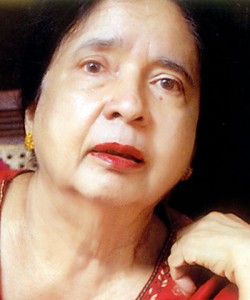 Do you view writing as a kind of spiritual practice? Does writing energize you or exhaust you?
Do you view writing as a kind of spiritual practice? Does writing energize you or exhaust you?
Yes, I do view writing as emanating from that divine sense of centrifugal power within myself – “the Blakesean vision” as the publisher and critic Michael Schmidth described my poetry. My work, my creative writing comes from the inner depths of my being in whatever genre I write, from poetry to fiction to playwriting to creative nonfiction. I use many genres to express my ideas. There is an invisible eye within my psyche and there is an alter-ego voice that speaks. Writing can be inspirational as well as cathartic. I do not interrogate the power of experience – it is a God given gift which I feel I have been blessed with and it is a gift I share with all those who wish to read me – that power within myself.
Tell us a little bit about your writing process. How do you carve time to write? Do you have any unique writing habits?
Well, a poem or a piece of fiction or even a play can happen with a word, a line, an utterance, visiting sites of time and memory. Writing to me is part of the sustenance of life and of the spirit.
As a teacher and lecturer, I spent years and years thinking on the needs of my students, introducing Sri Lankan writers as well as dealing with the great literary canons of literature. Now I do have more time for my writing – it happens all the time – poetry runs in my bloodstream. I live and breathe writing, imagery, language and deep landscapes (surreal as well as realistic). A myriad voices echo and re-echo in my head, mind, imagination but I do have my feet planted in the here and now of life.
What is the most difficult part of the writing process?
I do not talk in terms of “difficult” where writing is concerned but I do pay much consideration to shape, form, texture, visual as well as tactile and all the techniques and strategies of writing especially the disciplines I studied at the University of Strathclyde and Nottingham where I followed an intensive course in literary linguistics. Yes, editing (a great deal of self-editing) is of primary importance… Editing is necessary, pruning and shaping of the rose bush!
What’s the best book you have read recently?
I need to read every day – old books from my library (poetry/history/fiction) I love reading.
No, there is no best book – my daughter Daisy brings me the latest from Canada – a feast of reading from Alice Munro to Aravind Adiga. However, I do stress the fact that I am always on the lookout for Sri Lankan writers (past and present, the forgotten ones as well as the latest). My reading is both enlightening and revelatory.


